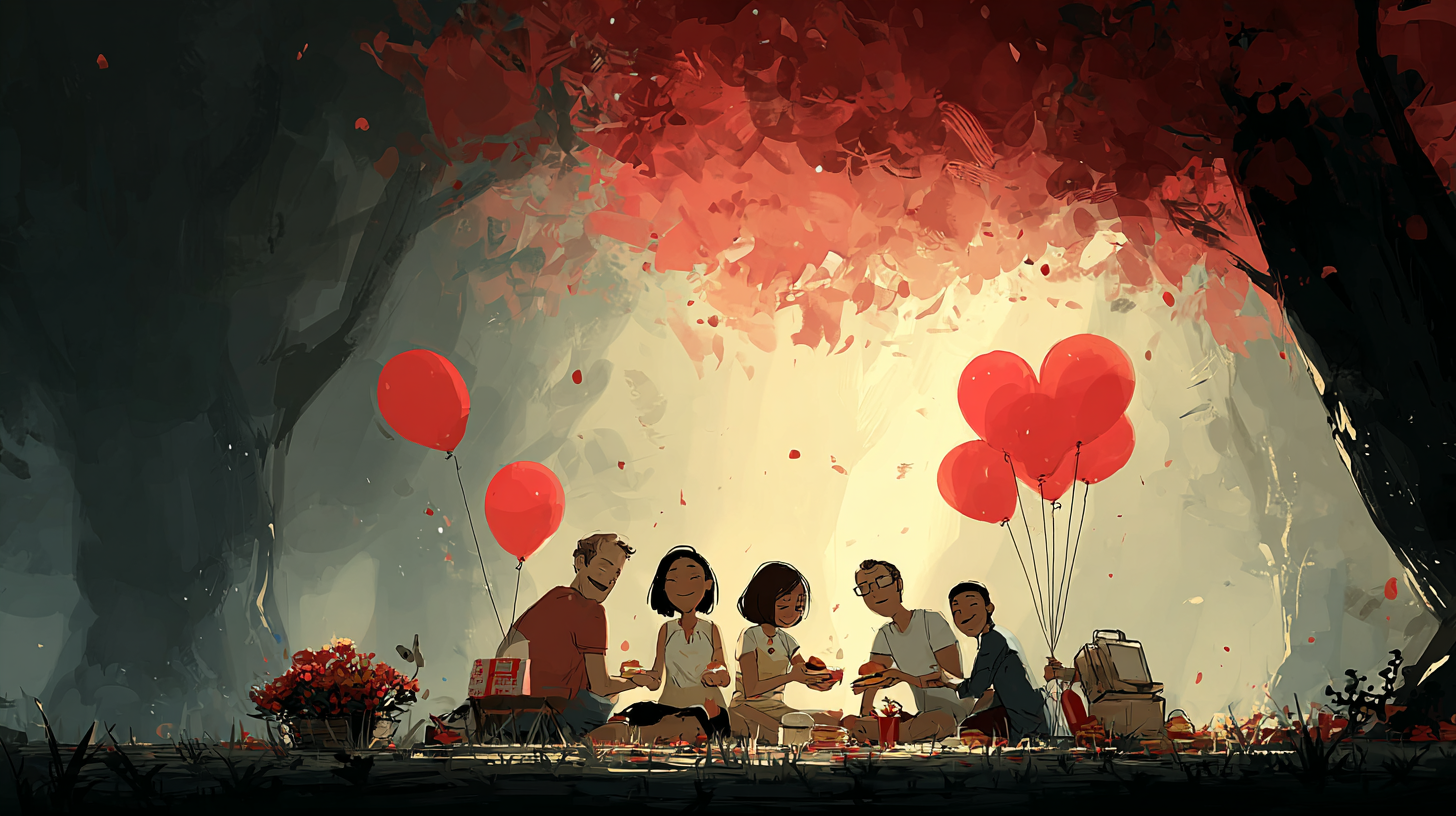“Bunch” means “a group of things or people together.”
「bunch」は「ひとまとまり」「束」「人の集まり」という意味。
以下は英単語 “bunch” に関するストーリー型学習コンテンツです。まずは大枠の意味を理解して最後の文章で確認しましょう。
主な意味(main meaning)
| 品詞 | 意味 | 発音記号 | 例文 |
|---|---|---|---|
| 名詞 | 束(花や果物など)、集まり、人のグループ | /bʌntʃ/ | She bought a bunch of flowers for her friend. |
| 動詞 | 束ねる、集める | /bʌntʃ/ | He bunched the papers together with a clip. |
語源(etymology)
「bunch」は中英語(Middle English)から来ており、元々は「小さなこぶ・ふくらみ」を意味していた。そこから「まとまり」「束」というイメージに発展した。
類義語(synonyms)
| 類義語 | 例文 |
|---|---|
| group | A group of students visited the museum. |
| cluster | A cluster of grapes was on the table. |
| bundle | He carried a bundle of clothes in his arms. |
| pack | A pack of wolves was moving through the forest. |
反義語(antonyms)
| 反義語 | 例文 |
|---|---|
| individual | Each individual has different talents. |
| single | She picked up a single flower from the garden. |
コロケーション(collocations)
| コロケーション | 例文 |
|---|---|
| a bunch of flowers | He gave her a bunch of flowers. |
| a bunch of grapes | We bought a bunch of grapes at the market. |
| a bunch of friends | She went to the park with a bunch of friends. |
| a bunch of keys | He lost a bunch of keys yesterday. |
2項表現(binomials)
| 2項表現 | 例文 |
|---|---|
| bits and pieces | He found bits and pieces of old toys in the box. |
| rules and regulations | We must follow the rules and regulations at school. |
英語ストーリー(english story)
Story: The Bunch of Friends and the Surprise Party
Emma had always been the one who liked to organize things. One sunny afternoon, she looked at her bunch of friends sitting in the park. They were laughing, talking, and eating sandwiches. “You know,” Emma said, “we should plan something special for Sarah’s birthday.”
Everyone agreed. Sarah was always kind and cheerful, so they wanted to give her a nice surprise. Emma suggested they prepare a bunch of flowers and a big cake. Tom said he could bring a bunch of grapes from his uncle’s farm. Mike offered to gather a bunch of balloons.
The group started making plans. They decided to meet at Sarah’s house on Saturday morning. Each person had a role. Emma would buy the flowers, Tom would bring the grapes, Mike would buy the balloons, and Anna would prepare music. “We make a great group,” Anna said. “Even though we are different individuals, when we come together, we are like a big bunch of happiness.”
On Saturday, everything went well at first. Emma had a beautiful bunch of roses. Tom carried a cluster of grapes in a basket. Mike came with a bundle of balloons, and Anna had her playlist ready. But then a small problem appeared. Mike lost a bunch of keys he needed to open Sarah’s backyard gate.
“Don’t worry,” said Tom, “I have a single spare key. We can still get in.” Everyone laughed with relief.
Finally, Sarah came home. When she opened the door, her friends shouted, “Happy Birthday!” Sarah was surprised and smiled brightly. She looked at the bunch of flowers and said, “This is wonderful!” She hugged her bunch of friends and thanked them.
The party was full of joy. They ate grapes, sang songs, and danced. At one point, Emma said, “Life is not only about rules and regulations. It’s also about fun with friends, even in little bits and pieces.”
Sarah nodded. “Yes,” she said. “Having a bunch of friends like you is the best gift ever.”
和訳
友達の集まりとサプライズパーティ
エマはいつも計画を立てるのが好きだった。ある晴れた午後、彼女は公園で座っている**友達の集まり(bunch of friends)**を見た。彼らは笑いながらサンドイッチを食べていた。
「ねえ、サラの誕生日に何か特別なことを計画しようよ」とエマは言った。
みんな賛成した。サラはいつも優しくて明るいので、みんな彼女にサプライズをしたかった。エマは**花の束(bunch of flowers)と大きなケーキを用意することを提案した。トムは叔父の農場からぶどうの房(bunch of grapes)を持ってくると言った。マイクは風船の束(bunch of balloons)**を集めると申し出た。
土曜日、みんなで準備を進めた。エマは**バラの花束(bunch of roses)を持ち、トムはぶどうの房(cluster of grapes)をかごに入れて持ってきた。マイクは風船の束(bundle of balloons)を持ち、アンナは音楽を用意した。しかし小さな問題が起きた。マイクがサラの庭の門を開けるために必要な鍵の束(bunch of keys)**をなくしてしまったのだ。
「大丈夫」とトムが言った。「僕は**1本の(single)**スペアキーを持っているよ。」みんな安心して笑った。
サラが帰宅すると、友達が「ハッピーバースデー!」と叫んだ。サラは驚いて、そして笑顔になった。**花束(bunch of flowers)を見て「最高!」と言った。彼女は友達の集まり(bunch of friends)**を抱きしめ、感謝した。
パーティは楽しい時間でいっぱいだった。彼らはぶどうを食べ、歌を歌い、踊った。途中でエマは言った。
「人生は**ルールと規則(rules and regulations)だけじゃなくて、小さなあれこれ(bits and pieces)**の楽しみも大事よ。」
サラはうなずいた。「そうね。こんな**友達の集まり(bunch of friends)**がいることが一番のプレゼントだわ。」
Q&A
Q: 「bunch」と「group」の違いは?
A: 「group」は中立的に「集まり」と言う意味で、フォーマルにもカジュアルにも使えます。一方「bunch」はくだけた表現で、仲間内や日常会話でよく使われます。例えば「a group of students」は普通の言い方ですが、「a bunch of students」は友達同士のカジュアルな表現です。
Q: 「bunch」と「cluster」の違いは?
A: 「cluster」は自然に固まっているものを表します。例えば「cluster of grapes(ぶどうの房)」は自然に一緒になっているぶどうのまとまりです。「bunch」は人がまとめた束(花束、友達の集まりなど)にもよく使えます。
Q: 「bunch」と「bundle」の違いは?
A: 「bundle」は「包んだ束」や「荷物のまとめ」で、重そうなイメージがあります。例えば「bundle of clothes(衣類の束)」や「bundle of newspapers(新聞の束)」など。「bunch」は軽くてカジュアルな集まりに使うことが多いです(花、ぶどう、友達など)。
Q: 「bunch」と「pack」の違いは?
A: 「pack」は「群れ」という意味で、特に動物に多く使います(a pack of wolves=オオカミの群れ)。「bunch」は人や物の集まりに幅広く使えますが、動物の群れには普通使いません。
Q: 「bunch」と「individual」の違いは?
A: 「bunch」は「集まり」ですが、「individual」は「一人ひとり」や「個人」という意味です。対比的に使うと、集団の中のそれぞれの人を強調することになります。
Q: 「bunch」と「single」の違いは?
A: 「single」は「ひとつだけ」という意味で、「bunch(束や集まり)」とは反対の概念です。例えば「a single flower(1本の花)」と「a bunch of flowers(花束)」は対比的に使えます。
Q: 「bunch of keys」と「key(単数)」の違いは?
A: 「bunch of keys」は複数の鍵をまとめて持っている状態を表します。普通はキーホルダーやリングにつけられているイメージです。「key(単数)」は1本だけの鍵を意味します。
Q: 「bunch of friends」と「group of friends」の違いは?
A: どちらも「友達の集まり」ですが、「group」はフォーマル・中立的な言い方、「bunch」はカジュアルで親しい雰囲気があります。例えば先生が「group of friends」と言うかもしれませんが、友達同士の会話では「bunch of friends」が自然です。
Q: 「bunch of grapes」と「cluster of grapes」の違いは?
A: 「bunch of grapes」と「cluster of grapes」はほぼ同じで、どちらも「ぶどうの房」を意味します。ただし「cluster」はより科学的・正確な響きがあり、「bunch」は日常的・カジュアルな響きです。



コメント